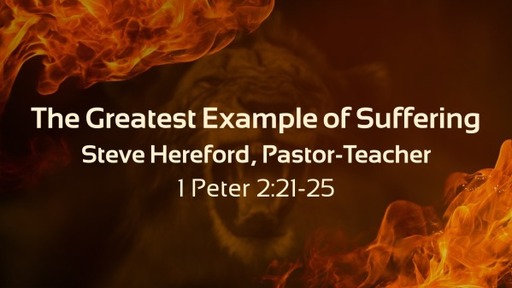The Greatest Example of Suffering

How are we to follow Christ when we're suffering? Join Pastor Steve as he teaches from 1 Peter 2:20-25.
Christ left His followers “an example” (hupogrammon), another rare term appearing only here in the Greek Bible, denoting a model to be copied by the novice. Literally an “underwriting,” the term could refer to a writing or drawing that was placed under another sheet to be retraced on the upper sheet by the pupil. More probably, the reference is to the “copy-head” that the teacher placed at the top of the page to be reproduced by the student. It is also possible that the reference is to an artist’s sketch, the details of which were to be filled in by others. According to each of those views, the example was not left merely to be admired, but to be followed line by line, feature by feature.
The original word order, “Sin not he did,” as well as the aorist tense verb (epoiēsen), stresses that not in a single instance did He succumb to an act of sin.
Christ was never guilty of expressing “deceit” (dolos, “cunning, subtlety, craftiness”) in anything that He said. The verb “found” (heurethē), stronger than “was,” indicates that His speech passed the most rigorous scrutiny of His enemies. No evidence of guile (see 2:1), so characteristic of fallen man, could be detected in His words. That confirmed His purity of heart (Matt. 12:34–35).
To “revile” is to pile up abusive and vile language against someone. Though verbally abused, Christ never retaliated with vicious words and threats (3:9; cf. Matt. 26:57–65; 27:12–14; Luke 23:7–11).
“No ungentle, threatening word escaped His silent tongue.”
When he suffered, he threatened not. That is, when he suffered injustice from others, in his trial and in his death, he did not threaten punishment. He did not call down the wrath of heaven. He did not even predict that they would be punished; he expressed no wish that they should be.
Christ “handed over” Himself to God, suffering in surprising silence, because of His perfect confidence in the sovereignty and righteousness of His Father (cf. Is. 53:7).
“bore” (anēnegken) is an aorist—a definite event, not a repeated practice. The verb means “to carry up,” to bring from a lower place to a higher, and is a ritual term. In the Septuagint it is used for bringing a sacrifice and laying it upon the altar (Gen. 8:20; Lev. 14:20; 17:5; 2 Chron. 35:16). In James 2:21 it is used of Abraham bringing his son Isaac to the altar. Clearly, Isaiah 53:12 was in Peter’s mind: “He bore the sins of many.”
To bear sins was to be punished for them (cf. Num. 14:33; Ezek. 18:20). Christ bore the punishment and the penalty for believers, thus satisfying a holy God (3:18; see notes on 2 Cor. 5:21; Gal. 3:13).
We died to sin in the sense that we paid its penalty, death, by being in Christ when He died as our substitute.
Apogenomenoi (might die) is not the normal word for “die” and is used only here in the New Testament. It means “to be away from, depart, be missing, or cease existing.” Christ died for believers to separate them from sin’s penalty, so it can never condemn them. The record of their sins, the indictment of guilt that had them headed for hell, was “nailed to the cross” (Col. 2:12–14). Jesus paid their debt to God in full. In that sense, all Christians are freed from sin’s penalty. They are also delivered from its dominating power and made able to live to righteousness (cf. Rom. 6:16–22).
Not only have we been declared just, the penalty for our sins paid by His death, but we have risen to walk in new life, empowered by the Holy Spirit (see notes on Rom. 6:12–22).
Like Isaiah before him, Peter uses physical healing as a metaphor for religious conversion
“You were like sheep going astray” pictures their former lost condition. The explanation changes the figure; the reference to straying sheep is an allusion to Isaiah 53:6, “We all, like sheep, have gone astray.”
Christ is not only the Christian’s standard (vv. 21–23) and substitute (v. 24), but He is also the Christian’s shepherd (5:4; cf. Is. 53:6; John 10:11). In the OT, the title of “shepherd” for the Lord was often messianic (Ezek. 34:23, 24; 37:24; cf. John 10:1–18).
